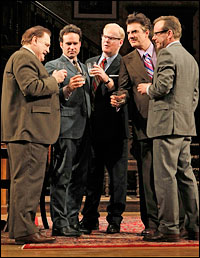
*
When That Championship Season opened in 1972, the play moved Jason Patric. Literally. Patric, age six, was too young to see his father's play, but the show's success changed his life. "We had no money at the time," Patric recalls. "My biggest memory was that all of a sudden, we moved out of our tenement in Flushing to Far Rockaway."
Gregory Mosher was moved more metaphorically. "It's hard to overestimate the power of that original production, which I saw one matinee, alone, left side of the orchestra, in 1972," he says. "It rocked my world...the simple power of the script, the fact that an entertaining play so clearly 'about something' was on Broadway." Obviously Jason Miller's play, about a coach in a downtrodden Pennsylvania town reuniting with his former players two decades after their glory days and long after their lives have all turned sour, struck a nerve. (It also won the Pulitzer Prize for Drama and the Best Play Tony Award in 1973.)
Fast forward to the present: Mosher contacts the late playwright's old agent about directing a Broadway revival of the play. The agent steers Mosher to the executor of Miller's estate... who turns out to be Patric.
"Gregory didn't even know I was Miller's son," Patric says. But he wasn't just going to sign off on any production — he wasn't a big fan of the Off-Broadway revival in 1999 (when his father was still alive), and furthermore, he knew he might want to revive it himself someday.
But Patric admired how Mosher had brought to life A View From the Bridge, which he says is "much more anachronistic and old-fashioned." His father's play was, by contrast, "ahead of its time," profane and hard-hitting in a way that set the stage for David Mamet. (Patric says several towns even banned it during the national tour.) Indeed, many of the themes that resonated with audiences in 1972 — clinging to the past, losing faith in political leaders, debating about an endless foreign war and fretting about a dying economy, especially for the working class — seem frighteningly relevant today.
| |
 |
|
| Brian Cox, Jason Patric, Jim Gaffigan, Chris Noth and Kiefer Sutherland | ||
| photo by Joan Marcus |
If he was going to approve a production, Patric says, "I wanted to have a say in things." Ultimately, he decided he trusted Mosher enough not only to sign off, but to sign up, taking on the role of Tom, the hard-drinking truth-teller. He told Mosher he'd take a different role if it would help the play, but the rest of the casting quickly fell into place. Patric's friend Kiefer Sutherland had recently told him he wanted to do a play; Patric brought Chris Noth to Mosher; and the director chose comedian Jim Gaffigan for the fourth teammate. While the play is unique in that it has five vital male roles and no other parts, casting the coach was crucial. Both Patric and Mosher had the same first choice: Brian Cox.
"We needed an iconic presence," Patric says. "The guys need to hear his voice and fall in line. Brian Cox is like a King Lear in the Lackawanna Valley."
Cox has countless stage and screen credits (Patric distinctly remembers his pre-Anthony Hopkins turn as Hannibal Lecter in "Manhunter"), including an acclaimed turn as Lear. But he loves Miller's script for more than just his role. "It's an extraordinary piece of Americana and psychology," Cox says. "It tackles the American ethos and ideas about success and the heroism of the American male that are so ingrained in American society."
Cox, of course, is from Scotland, but he thinks his outsider's view gives him a unique viewpoint, since he finds America's — and his character's — "unquestioned allegiance to flag and Christianity" foolhardy. Cox also found that despite the play's "in-your-face, very textual approach" there was "great depth and subtlety." The bittersweet irony is that the play created a resonant echo in playwright Miller's life. He earned an Oscar nomination playing the priest in "The Exorcist" the same year he won the Pulitzer Prize and Tony Award for his play and spent the rest of his life unsuccessfully trying to measure up to that glorious year. While he eventually found stability running a regional theatre in Scranton, Pennsylvania, his playwriting dried up, his acting career never blossomed, and his biggest screenwriting credits were the 1982 movie and 1999 TV versions of That Championship Season. Miller died in 2001 from a heart attack at the age of 62.
"The play became such a part of our lives and his person, and in some ways it was a burden," Patric says.
Mosher says there'll be a certain inherent poignancy in Patric's performance, since Miller wrote that the play on some level was about men coming to terms with their fathers. Patric says he never really discussed the characters with his father but says he wants to put his family's legacy aside. "I want to come at this from my own angle," he says, adding that the connection to his father he is seeking is with "the 32-year-old guy who wrote this, not the guy who lived it out for the rest of his life."










